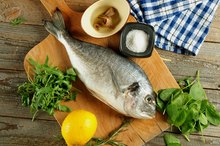Do Shrimp & Scallops Increase Cholesterol Levels?
When asking if shrimp and scallops increase cholesterol levels, most people really want to know if they increase your levels of harmful cholesterol. Nutrition science identifies two kinds of cholesterol in your blood, one good and one bad. The fats and oils in shrimp and scallops can affect the levels of both.
Kinds of Cholesterol
Your body produces two different kinds of cholesterol: high density lipoproteins (HDL) and low density lipoproteins (LDL). Although both are necessary to your basic body functions, too much LDL cholesterol puts you at higher risk for heart attack, high blood pressure and stroke. HDL cholesterol actually reduces your risk by helping to clean the dangerous LDL out of your system. When you get your cholesterol measured at the doctor, the measure of "total cholesterol" accounts for this interaction by subtracting your HDL count from your LDL count.
- Your body produces two different kinds of cholesterol: high density lipoproteins (HDL) and low density lipoproteins (LDL).
- When you get your cholesterol measured at the doctor, the measure of "total cholesterol" accounts for this interaction by subtracting your HDL count from your LDL count.
Nutrition Information
Cholesterol & Seafood
Learn More
According to the US Department of Agriculture, a 3-ounce serving of shrimp contains 0.2 grams of saturated fat and 0.6 grams of unsaturated fat 1. Three ounces of scallops contains no appreciable amount of saturated fat, and 0.1 grams of unsaturated fat. In both cases, these are for plain, steamed seafood. Different cooking methods -- such as breading and deep frying -- can change this nutrition profile significantly.
- According to the US Department of Agriculture, a 3-ounce serving of shrimp contains 0.2 grams of saturated fat and 0.6 grams of unsaturated fat 1.
Fats and Cholesterol
Your body produces harmful LDL cholesterol in response to the presence of saturated fat in your diet. It produces HDL cholesterol when you eat unsaturated fats. How heart-healthy a food is depends more on the ratio of beneficial unsaturated fat to harmful saturated fat than it does on the simple amount of fat the food contains.
Shrimp, Scallops and Cholesterol
Is Peanut Butter Bad If You Have High Cholesterol?
Learn More
Both kinds of seafood have overwhelmingly more unsaturated fat than saturated fat, and relatively low amounts of both. This means that both shrimp and scallops are an acceptable choice for people restricted to a low-cholesterol diet. Again, this assumes they are being cooked without sauces or other ingredients that themselves contain high amounts of saturated fats.
- Both kinds of seafood have overwhelmingly more unsaturated fat than saturated fat, and relatively low amounts of both.
- Again, this assumes they are being cooked without sauces or other ingredients that themselves contain high amounts of saturated fats.
Related Articles
References
- US Department of Agriculture National Nutrient Database for Standard Reference
- "Eat, Drink and Be Healthy;" Walter Willett; 2004
- U.S. Department of Health and Human Services and U.S. Department of Agriculture. 2015–2020 Dietary Guidelines for Americans. 8th Edition. Published December 2015.
- American Heart Association. Fish and Omega-3 Fatty Acids. Updated March 23, 2017.
- U.S. Food & Drug Administration. FDA and EPA issue final fish consumption advice. Published January 18, 2017.
Writer Bio
Jake Wayne has written professionally for more than 12 years, including assignments in business writing, national magazines and book-length projects. He has a psychology degree from the University of Oregon and black belts in three martial arts.









